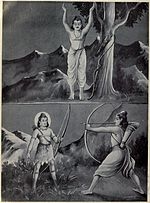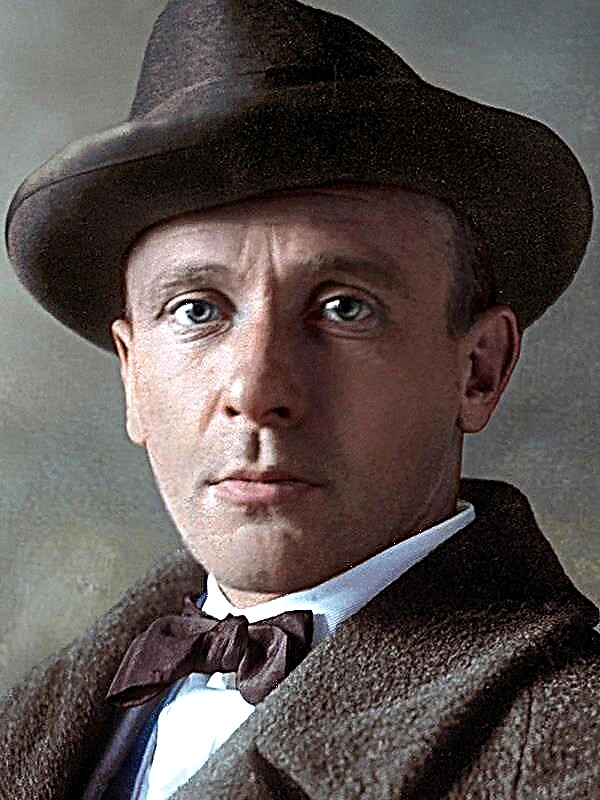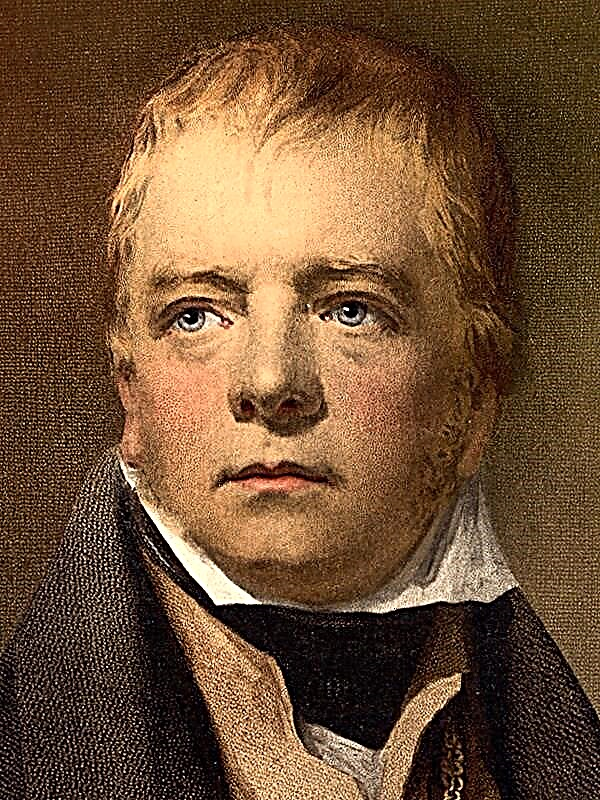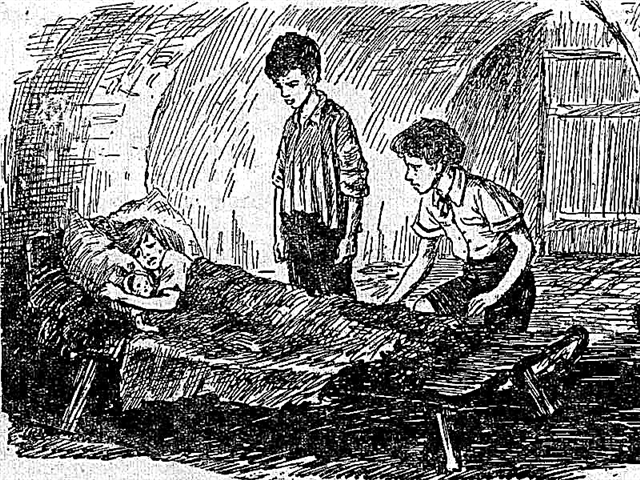The action takes place between 1420 and 1430. The population of the free city of Augsburg is looking forward to the jousting tournament in which the Duke Albrecht of Bavaria himself, the son of the ruler of Munich, Ernst of Bavaria, is participating. Everyone is eager to get to this spectacle, take places in advance. Agnes, the daughter of Caspar Bernauer, a well-known barber and doctor in the city, is going to the tournament without any desire. She had already been visited by one of the girlfriends whom her confessor had sent to apologize for the stupid gossip about Agnes. But the girlfriend does not want to apologize, “it’s better with her knees on peas,” because the attention of all knights will belong only to the daughter of the barber. At the same time, everyone knows that Agnes always keeps her eyes down, like a “nun” or “holy” - yes “not really”. It is clear that every guy wants such a girl "from the Lord from under his nose to take." Agnes is not inclined to spoil the holiday of her friends, but her father insists: not "sort out the rosary", sitting at home. Caspar remains, preparing to accept all the crippled after the tournament, they are still brought to him.
Agnes goes to the tournament accompanied by his godfathers. There she is seen by the Duke Albrecht and falls in love at first sight. Invited by the burgomaster to the evening festival, he drained the cup in honor of the city, where "such a star shines, such beauty." He had already forgotten that he had ordered his three faithful knights to pursue the kidnapper of his bride, Countess of Württemberg, in order to demand a large bride from her father. The knights suspect that their overlord is abandoning his plan because of the rumor that it was rumored to drive half a city crazy with its beauty, it is called the “Augsburg Angel”.
At the festival, many nobles and urban artisans gather. Albrecht makes his knights find a girl whose "face is framed by golden curls." Agnes appears accompanied by her father and in response to the duke's exquisite and magnificent appeal to her, resourcefully remarks to the father that the duke has prepared a speech for his bride, and here he learns it, turning to the barber’s daughter. The duke manages to speak a few words with the girl in the absence of her father. He caught her eye at the tournament, and she cannot deny that she was worried about him.
A few minutes later Albrecht already declares his love to Agnes and asks her hand from Caspar. He reminds the duke that fifty years ago, for her only appearance at the tournament, the girl would have been carved with whips as the daughter of a man from the lower class. The situation has changed, but the class abyss exists. The duke assures that after another fifty years every angel like Agnes will “be honored with a throne on the earth,” and he himself is the first to set an example. Caspar leads her exhausted daughter.
In the morning, the knights discuss a situation that, for a divided into three parts of Bavaria, could lead to a serious political problem. Albrecht is the only heir to the Duke Ernst (on the side branch, however, he has a nephew, but a minor and painful). Children from the marriage between Albrecht and Agnes by their origin will not be able to claim the throne. Disputes and a new division of the country will become inevitable. The Knights remind Albrecht of his father, for whom state dynastic interests above all, he can deprive the son of the throne. But the duke can no longer be stopped.
Realizing that his daughter loves the duke, Caspar does not object to marriage, he counts on the prudence of Agnes and the nobility of Albrecht. Agnes wants to make sure that Albrecht will be happy with her, even if the Duke Ernst curses him. But Albrecht is already happy, he “looked” into the eyes and heart of Agnes. The three knights of Albrecht swear eternal fidelity. However, they, like Agnes, do not leave bad forebodings.
Find a priest ready to marry a couple. The wedding takes place that evening in a small chapel, secretly. The next morning, the duke takes Agnes to his castle in Faubourg, presented to him by his late mother.
And in the castle of Munich, the Duke Ernst bitterly recalls the former greatness of his country, lost by the frenzy of some Bavarian princes. Ernst learned about the son’s bride’s flight and has already calculated which of the mortgaged cities will be able to redeem for the money that the bride’s father will pay as a ransom. He heard rumors of events in Augsburg, so without taking it seriously, he immediately grabbed his son to "the most beautiful bride in Germany," Anna Braunschweig. Consent has already been received, and the Duke is very pleased with this alliance beneficial to Bavaria, which will put an end to bloody strife. When Chancellor Preising reports to him about the “secret engagement” of his son, he condescendingly notes that “with pleasure or not, right away or not right away,” but the son will agree with his father. Ernst sends Preising to Albrecht to inform about his decision and invite him to a tournament in Regensburg, where they will publicly announce their engagement to Anna.
Happy lovers accidentally find in their castle the valuables of Albrecht's mother. The son, against the desire of Agnes, puts on her a golden diadem - she looks in her like a real queen! But Agnes is embarrassed and ashamed, for she appeared here uninvited and feels in the eyes of the old servants a “stain” on their lord.
Preising tells Albrecht about the meaning of the marriage with Princess Anna. The duke himself knows this, as well as the fact that his father’s plans cannot be destroyed, so that "not to stir half the world." He considers himself entitled, like every mortal, to choose a girlfriend himself. Preising remarks that one who rules over millions of people, “once,” must make a sacrifice to them. But for Albrecht, “once” is “hourly,” he does not want to give up happiness.
Albrecht goes to the tournament assuring Agnes that only death can separate them. Before the tournament, the father once again asks his son whether to order the engagement to be announced with Anna. Albrecht refuses, noticing his father that he knelt in vain in front of him. He proclaims publicly that he tied the knot with "the immaculate and good daughter of a city dweller from Augsburg." In response, the Duke Ernst loudly announces that he is depriving the son of the crown and ducal mantle that he left “at the altar”, and declares the infant heir Adolf.
Three and a half years pass. Adolf's parents are dying. And now the funeral bell sounds according to the prince himself. A servant tells Preising that the “witch from Augsburg” is blamed for everything in the city. The Chancellor understands that hard times have come. He gets into the hands of a document prepared immediately after the tournament in Regensburg by three judges. It says that Agnes, guilty of concluding an “anti-esteem” marriage, is “worthy of execution” to avoid the gravest ills. Ernst's signature missing. The Duke is discussing this document with the Chancellor. Both understand that if the order of inheritance is violated, sooner or later an internecine war is coming. Thousands of people will die, the people will curse the duke and the memory of him. The Chancellor is looking for exit options. But the duke calculated everything, not excluding the attempts of suicide on the part of his son, and a possible attempt to raise his sword against his father. Both feel - terribly that the "beautiful and virtuous woman" must perish. But there is no way out, "the Lord wants this, and not otherwise." The Duke signs the document ...
Albrecht leaves for the next tournament. Upon learning of the demise of the heir, he expects that his father now has the "honorable path to retreat," and cheerfully says goodbye to his wife. Vague forebodings torment her.
In the absence of Albrecht, Ernst's numerically superior warriors managed to defeat the castle guards. Agnes, surrounded by frustrated servants, is taken to prison by force. Preising comes to her, who is trying to save the unfortunate. He convinces Agnes to abandon Albrecht and "take a vow", otherwise death, which is waiting outside the cell, "knocks on the door." Agnes fears death, but rejection of her spouse is considered a betrayal. Albrecht would prefer to "mourn the dead" - and Agnes goes to death, confident in her innocence. The executioner refused to execute, and by order of the judge, one of the servants pushes Agnes from the bridge into the waters of the Danube. The villages burned, burned by Albrecht, who fights with the soldiers of his father, avenging the death of Agnes. His knights bring captive Ernst and Preising. Ernst replies to all the charges of his son that he was doing his duty. Albrecht tells him not to touch his father, because Agnes is gone, and he has no one else to kill. Albrecht himself is already captivating the soldiers behind him to burn Munich. He is stopped by his father’s words, that even then the Bavarians would surely curse Agnes’s name, and they could even mourn. The father begs the son to look into his own soul, admit his sin and atone for guilt. And Agnes will be publicly recognized as his wife and "the purest of the sacrifices ever made to the altar of necessity."
The last vibrations of Albrecht are terrible. But still he takes the ducal rod from the hands of his father. Duke Ernst leaves for the monastery.




 Elder from the East Hall
Elder from the East Hall


 Metamorphoses
Metamorphoses


